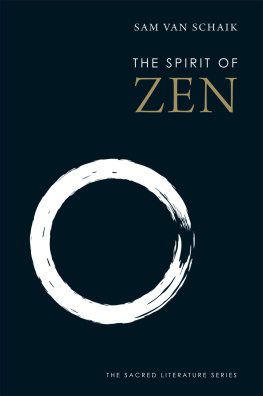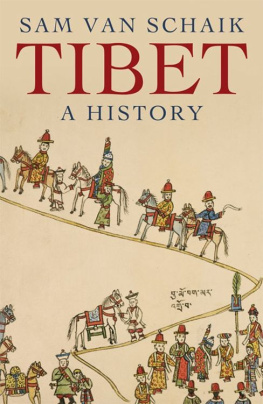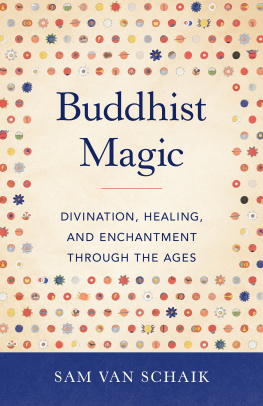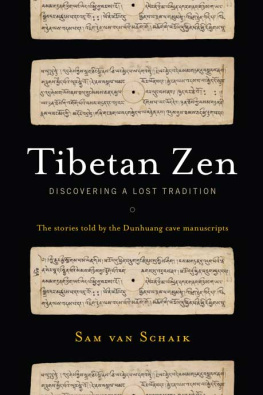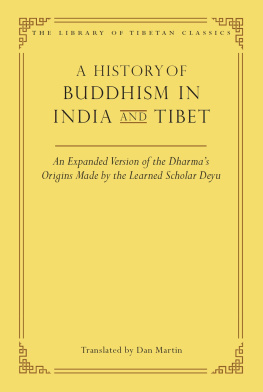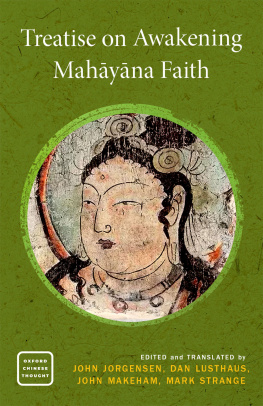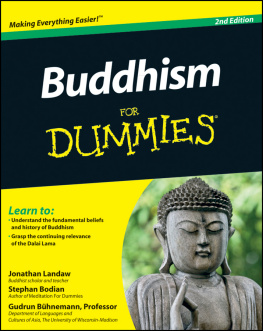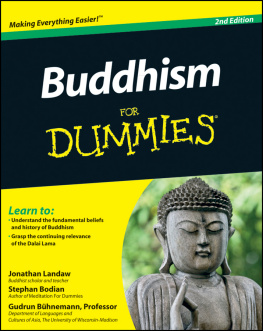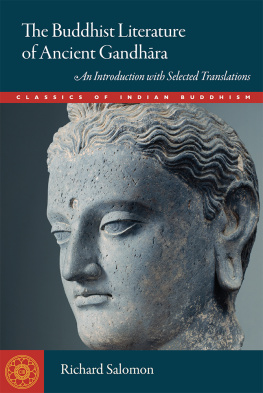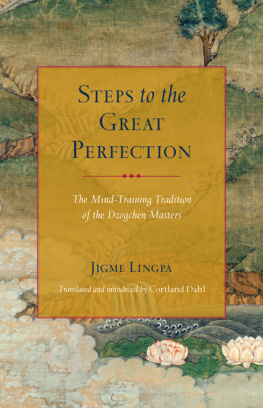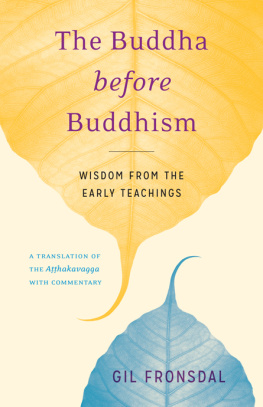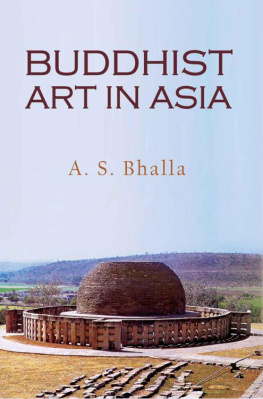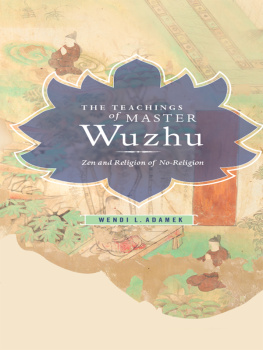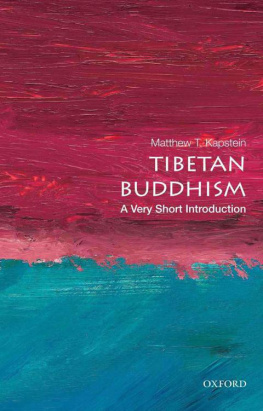
THE SPIRIT OF ZEN

Copyright 2018 Sam van Schaik
All rights reserved. This book may not be reproduced in whole or in part, in any form (beyond that copying permitted by Sections 107 and 108 of the U.S. Copyright Law and except by reviewers for the public press) without written permission from the publishers.
For information about this and other Yale University Press publications, please contact:
U.S. Office:
Europe Office:
Set in Arno Pro by IDSUK (DataConnection) Ltd
Printed in Great Britain by TJ International Ltd, Padstow, Cornwall
Library of Congress Control Number: 2018942946
ISBN 978-0-300-22145-9
A catalogue record for this book is available from the British Library.
10 9 8 7 6 5 4 3 2 1

The International Sacred Literature Trust was established to promote understanding and open discussion between and within faiths and to give voice in todays world to the wisdom that speaks across time and traditions.
What resources do the sacred traditions of the world possess to respond to the great global threats of poverty, war, ecological disaster, and spiritual despair?
Our starting-point is the sacred texts with their vision of a higher truth and their deep insights into the nature of humanity and the universe we inhabit. The publishing program is planned so that each faith community articulates its own teachings with the intention of enhancing its self-understanding as well as the understanding of those of other faiths and those of no faith.
The Trust especially encourages faiths to make available texts which are needed in translation for their own communities and also texts which are little known outside a particular tradition but which have the power to inspire, console, enlighten, and transform. These sources from the past become resources for the present and future when we make inspired use of them to guide us in shaping the contemporary world.
Our religious traditions are diverse but, as with the natural environment, we are discovering the global interdependence of human hearts and minds. The Trust invites all to participate in the modern experience of interfaith encounter and exchange which marks a new phase in the quest to discover our full humanity.
To Aaron and Kristian
CONTENTS
PREFACE
In this book, I have tried to strike a balance between introducing readers to Zen, and providing a translation that brings something new even to those who are very familiar with the tradition. I have done this by looking at the continuities between one of the earliest Zen texts and the practice of Zen through the centuries, down to the present day. Traditional presentations of religions tend to emphasize constant truths, while academics often delight in discovering disjunctions and contradictions. I have sought a middle way here as well, showing the changes the Zen tradition has gone through over time and in different cultural settings, while tracing threads of continuity that make it possible for us to talk about a Zen tradition at all.
Naturally, quite a bit of this book is about meditation. If readers who are new to Zen are interested in taking up meditation practice, there are some excellent books written by Zen teachers, some of which are listed in the References. I defer here to the advice given by James Ishmael Ford to anyone interested in beginning Zen meditation:
if the Zen path sounds right for you, I would suggest you start by taking up the practice of Zen meditation pretty much right now. You can get the basics out of many good books: John Daishin Buksbazens Zen Meditation in Plain English would be a good way to start, as would Robert Aitkens Taking the Path of Zen. A visit to a local Zen group of any flavor can provide some hands-on instruction that can clarify most beginning questions.
Turning to the scholarly side of this book, this is my first published translation of a Chinese text of some length, and I owe a debt of gratitude to those who have made it possible. First and foremost, for encouraging me to learn and translate Classical Chinese, and for reading and offering many helpful comments and corrections on this text, I offer grateful thanks to Imre Galambos. I am also grateful for Sinological advice offered by colleagues at the British Library, including Susan Whitfield, Emma Goodliffe and Mlodie Doumy. I would also like to thank Nathalie Monnet of the Bibliothque nationale de France for her insights into the manuscripts from the Pelliot collection in Paris.
I am also immensely grateful for the work of scholars and practitioners whose work has helped my understanding of the history, texts, practice and indeed spirit of Zen. For this book in particular I would like to mention Wendi Adamek, Christoph Anderl, Charlotte Joko Beck, Marcus Bingenheimer, Jeffrey Broughton, Thomas and Jonathan Cleary, Huw Davies, Bernard Faure, James Ishmael Ford, Griffith Foulk, Taigen Dan Leighton, Carmen Meinert, John McRae, Jan Nattier, Bill Porter, James Robson, Morten Schltter, Robert Sharf, Jonathan Silk, Kirill Solonin and Kazuaki Tanahashi. And for showing how the principles of Mahayana Buddhism are manifested in daily life, I owe immeasurable thanks to Lama Jampa Thaye.
There are an increasing number of excellent resources for studying and translating Classical Chinese. Two of the best are the Digital Dictionary of Buddhism and the Chinese Text Project, the results of the tireless work of Charles Muller and Donald Sturgeon respectively. Images of many of the manuscripts containing the Masters of the Lanka are available on the website of the International Dunhuang Project, and digital transcriptions have recently been made available by the Dunhuang Manuscript Full Text Digitization Project. In the original spirit of the internet, all of these resources are free to use.
My work on this translation was supported by the European Research Council, funders of the project Beyond Boundaries: Religion, Region, Language and the State (ERC grant agreement no. 609823) a small example of the many good things that have come out of the European Union. The idea for the book was first suggested by Malcolm Gerratt at Yale University Press, and after his retirement the project was overseen by Robert Baldock; the editors were Rachael Lonsdale and Clarissa Sutherland, and the copy-editor was Beth Humphries. I am thankful for their professional work and guidance. At an early stage, Sarah Shaw offered sage advice which helped to shape the book. Finally, I thank my wife Ananda, daughters and family for their kindness, forbearance and support.
PART I
INTRODUCING ZEN
CHAPTER ONE

THE PRACTICE OF ZEN
Peace of mind
Cannot be summed up in words;
True understanding of it
Comes from your own heart.
Daoxin in Masters of the Lanka
Peace of mind
The earliest Zen teachers talked about meditation in terms of peace of mind, a state free of the anxieties and irritations which afflict us all. They taught that this peace is not to be obtained through our usual preference of surrounding ourselves with what we like and banishing what we dislike. Instead, it is to be found by getting to grips with the nature of our own minds.
This insight is at the heart of Zen. The Buddhas teachings are based on the principle that we want to be free from suffering, but are going about it in the wrong way. Thus the Buddhas four noble truths begin with suffering, though suffering is really too narrow a translation for the word he used,
Next page
